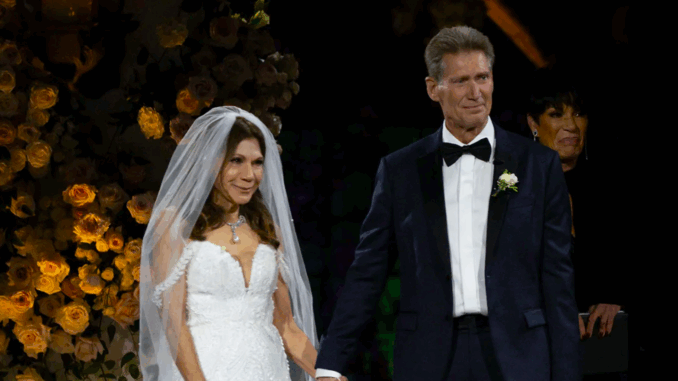
When The Golden Bachelor premiered, it promised something radical: a love story later in life, driven by experience, maturity, and second chances. At its center was Gerry Turner, a 72-year-old widower from Indiana, whose tearful sincerity won over millions of viewers. Along the way, he courted Theresa Nist, a 70-year-old financial services professional with a quiet strength and steady heart. Their televised romance culminated in a live wedding on national television in January 2024—a hopeful symbol that true love could bloom at any age.
But just three months later, Gerry and Theresa stunned fans by announcing their divorce. Suddenly, the fairy tale had fractured. And while the breakup may seem like just another reality TV twist, it carries deeper consequences for The Golden Bachelor franchise and the cultural movement it helped ignite.
A Dream That Was Bigger Than Them
Gerry and Theresa weren’t just individuals seeking love; they were avatars of a larger narrative—that love isn’t reserved for the young, that life doesn’t end at 60, and that dignity and romance can coexist on reality TV.
Their swift breakup was not just personally heartbreaking—it was symbolic. For the millions of viewers who saw themselves in Gerry and Theresa’s journey, the divorce felt like a betrayal of hope. But was that expectation ever realistic?
Reality TV relationships are notoriously fragile. The pressures of public scrutiny, rapid courtship timelines, and geographically split lives are enough to challenge even the most committed couples. But for older contestants—many of whom have children, grandchildren, homes, and deeply rooted routines—the stakes are even higher.
What Went Wrong: Public Explanation vs. Private Complexity
On Good Morning America, the pair explained that they still cared for each other but couldn’t align their lives. “We looked at our situation and realized we didn’t want to continue in a long-distance marriage,” Gerry admitted, citing a lack of clarity about where to live.
Theresa echoed that sentiment, acknowledging that blending families and uprooting their lives wasn’t as simple as falling in love on a beach or mansion patio. For all their warmth and connection, reality didn’t match the fantasy.
And that, perhaps, is the central lesson: even the most golden of romances still have to contend with the logistics of real life.
Damage Control—or Necessary Honesty?
The producers of The Bachelor franchise were quick to spin the news into a conversation about the “realities of senior dating.” Jesse Palmer, the show’s host, emphasized that older adults face different relationship hurdles than their younger counterparts—like medical considerations, home ownership complications, and family integration.
But some fans weren’t buying it. Social media buzzed with accusations that the show was never about authenticity, and that it had cast Gerry as a romantic ideal without revealing enough of the truth—his past relationships, emotional limitations, and even his sincerity.
Theresa, on the other hand, emerged from the divorce with her reputation intact. She was seen as thoughtful, patient, and grounded throughout the season and after. Some fans even began lobbying for her to become The Golden Bachelorette.
The Bigger Picture: Can Love Still Be Found in Later Life?
Despite the high-profile split, The Golden Bachelor remains a watershed moment in reality TV. For the first time, mainstream dating television put seniors front and center—not as comic relief or tragic figures, but as complex, passionate people.
Their love story, brief as it was, showed audiences that vulnerability doesn’t vanish with age, that heartache can still hurt at 70, and that it’s never foolish to try again.
In a culture obsessed with youth, The Golden Bachelor reminded viewers of all ages that the search for connection never ends. In that sense, Gerry and Theresa’s relationship—successful or not—fulfilled its purpose.
What It Means for The Golden Bachelorette

The upcoming season of The Golden Bachelorette, led by Joan Vassos, carries the weight of this legacy. Audiences will arrive with sharper eyes, perhaps more skeptical—but also more invested.
Joan’s journey will need to navigate a careful balance: hopeful, but grounded. Romantic, but honest. Emotional, but practical. The franchise can no longer hide behind polished fantasy; it now must embrace the real complexities of aging and affection.
In a strange way, Gerry and Theresa’s breakup may have gifted the show a chance to grow up—to stop promising perfect endings, and instead embrace love in all its bittersweet forms.
A Love Story That Still Mattered
So, did Gerry and Theresa “fail”? Maybe. But they also started something bigger than themselves. They opened the door for other seniors to feel seen. They created space for late-in-life dating to be discussed without stigma. And they reminded millions of viewers that it’s okay to be vulnerable again—no matter how many years or scars we carry.
In the end, the Golden goodbye might not be the end of the dream—it may just be the beginning of a deeper, more honest one.